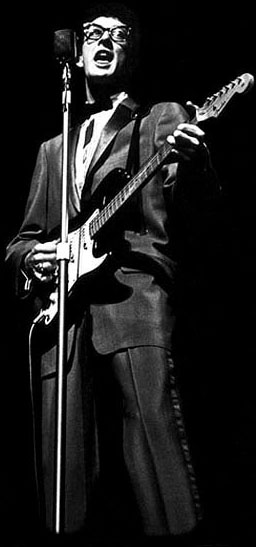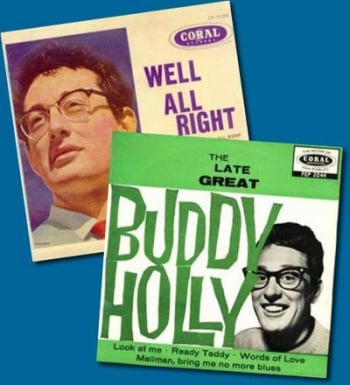Buddy Holly
Contents |
Introduction
Buddy Holly was one of the early pioneers of rock and roll, along with Chuck Berry he helped shape the future of modern music, paving the way for The Beatles, The Beach Boys, The Rolling Stones and all that followed. Whereas Elvis had a great voice and stage presence, he was not a great instrumentalist or songwriter. Holly was among the first to concern himself with all aspects of his music, including recording. He was a prolific songwriter and though equipment was primitive at the time his guitar playing was innovative and along with Chuck Berry he can be credited with making the guitar the most important instrument in all genres of modern music.
His guitar playing and songs may in todays context appear simple, but his great legacy is the influence he had on the development of rock and pop.
His professional career in music was very short, only about 18 months, before he was tragically killed an an airplane crash.
Early Life
Buddy whose full name was Charles Hardin Holley was born September 7, 1936 in Lubbock, Texas. Undoubtedly his first experiences in music would have come from singing hyms in church. Other musical influences would have come via radio where he heard country music, most notably the music of Hank Williams. It is also likely that he will have listened to blues music via radio.
Buddy began taking piano lessons at the age of 11 but quickly switched to acoustic guitar. In 1951 Buddy and Bob Montgomery a school friend who also played guitar began playing together as Bob and Buddy, playing school functions and appearing on local radio shows. They were soon jouned by Larry Welborn on bass, but didnt often use drums. The would play mainly country songs, with Montgommery taking lead vocal and Buddy Holly providing the harmonies.
1955 proved to be an important year for Buddy and Bob. They played in a number of important shows in Lubbock as support for famous rock and roll acts such as Elvis and Bill Hailey & The Commets. This influenced Buddy greatly in that his music moved more towards rock and roll. Also these shows brought Buddy to the attention of Eddie Crandall who negotiated a recording contract for Buddy with Decca records.
Music Career
Decca misspelled his name and from then on he became Buddy Holly rather than Holley. His first recording sessions took place in 1956 in Nashville and one of the songs recorded at that session was "That'll Be The Day" which was eventually to become one of his biggest hits. Decca however weren't particularly impressed and released other songs which were not sucessful. Decca liked Buddy's songs but were not convinced of his worth as a recording artist. They suggested that they use other singers to record his songs, but Buddy resisted this. The result was that they cancelled his recording contract but insisted that he could not re record any of the songs recorded with them for five years.
Norman Petty then took over management of Buddy and his group. Petty took Buddy to his recording studios in Clovis, New Mexico. Some of the best recordings of Holly's songs were made there with Petty acting as recording engineer.
The dispute with Decca meant that Buddy was unable to release his songs under his own name and they were released under the name of The Cricketts on Brunswick records. Petty also claimed and insisted upon a writing credit.
"That'll Be The Day" was again released and began to sell eventually becoming a big hit. THe hits for Buddy and the Crickets continued for the next year or so and the group toured extensively also.
Buddy is of course famous for playing a Fender Stratocaster and his rhythm and lead playing have influenced many.
Death
Though Buddy and The Crickets were sucessful they had trouble getting royalty money from Petty. This led Buddy to leave Texas and move to New York with his new wife. Buddy enjoyed the life in New York and had plans to collaborate with artists such as Ray Charles and also to try to break into films like Elvis. However he was broke and so early in 1959 he signed up to a three week tour. Basically the tour meant, "another day, another town another show"! Also on the tour were J.R Richardson (AKA The Big Bopper) and Ritchie Valens.
Following their show at the Surf Ballroom in Clear Lake, Iowa on February 2, 1959 the three musicians chartered a plane to take them to their next gig at Moorhead, Minnesota. Shortly after takeoff the plane crashed and all onboard were killed.
Don McLean called this "THe Day The Music Died" in his song American Pie.
Discography
Only three albums were released during his lifetime.
1957 The "Chirping" Crickets
1958 Buddy Holly
1958 That'll Be the Day
Since his death there have been many more releases, many compilations but also many using material which Holly had recorded as demos before his death. Many of these were just home recordings and therefore of poor quality or incomplete. Unfortunately many of them have been ruined by unsympathetic and often "schmaltzy" additions and arrangements.
Video
Influence
As one of the pioneers of rock and roll his influence is inmense. Not least is the fact that he was the first to establish the group format as drums, bass and two guitars.
He was a big favourite and influence on The Beatles who played his songs throughout their career right from their days in Hamburg and of course they did a great version of "Words of Love" on The Beatles For Sale album featuring great guitar work by George Harrison. Both John Lennon and Paul McCartney covered Buddy songs during their solo years.







